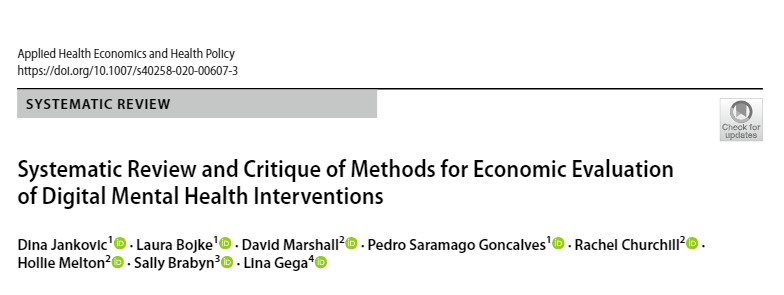Digital interventions for mental health (DMHIs) have been talked about a lot during the pandemic, with higher demand for mental healthcare and reduced access to face-to-face care. But what is the evidence behind them?
We've just done a project on this at @UniOfYork...
We've just done a project on this at @UniOfYork...
Evidence around the value of DMHIs is uncertain. There are many studies that evaluate DMHIs, but we couldn't compare and combine findings from different studies to draw any meaningful conclusions about their cost-effectiveness.
Why? DMHIs are complex interventions - they vary in content, mode of delivery, level of personalised support, target population, place in therapy and delivery setting. Studies in different settings are not necessarily comparable.
We describe the research gaps and methodological challenges in our recent paper in @ApplHealthEcon: https://rdcu.be/b6joi
The research gaps include:
1. Studies that synthesise all available evidence in a way that’s required for decision making.
2. Long term outcomes - how sticky is the treatment effect?
3. Treatment effect in treatment sequencing.
1. Studies that synthesise all available evidence in a way that’s required for decision making.
2. Long term outcomes - how sticky is the treatment effect?
3. Treatment effect in treatment sequencing.
So what needs to happen next?
1. We need more detailed reporting in future clinical trials to enable evidence synthesis where complexity of DMHIs is accounted for appropriately.
1. We need more detailed reporting in future clinical trials to enable evidence synthesis where complexity of DMHIs is accounted for appropriately.
2. Model based evaluations that consider all available evidence while accounting for the intervention complexity. These need to be decision-making context specific.
3. Better understanding of long term outcomes, and outcomes at different points in the treatment pathway.
3. Better understanding of long term outcomes, and outcomes at different points in the treatment pathway.
We addressed some of these research gaps in an economic evaluation of digital interventions for generalised anxiety disorder (GAD)... Results coming soon*.
*probably, pending peer review
*probably, pending peer review

 Read on Twitter
Read on Twitter



